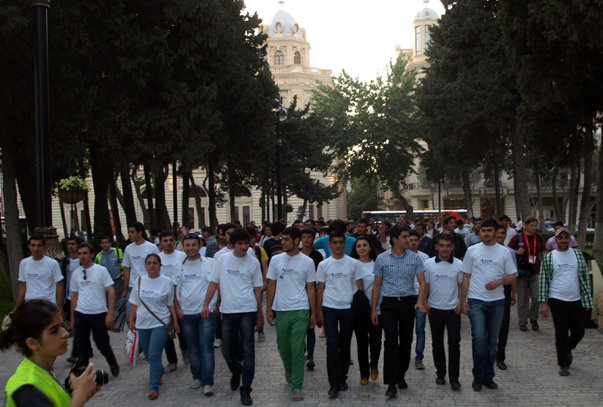As Azerbaijan prepares for the Eurovision Song Contest finale on May 26, local human rights groups are warning that once international media interest wanes, the government will launch a crackdown to punish those who used the event to criticise its record.
Winning the right to host Eurovision was a major coup for the government, which saw it as a chance to advertise a country that remains unfamiliar to many Europeans.
For human rights groups and the political opposition, however, the contest was an opportunity to draw international attention to restrictions on free speech and other concerns, which some argued made Azerbaijan an unsuitable host for the pan-European event. A campaign called “Sing for Democracy” made the link explicit. (See also Azerbaijan Rights Situation Poor Despite Eurovision Spotlight.)
Read also
In the run-up to Eurovision, several conferences on human rights have been held place in Baku, and protest rallies have taken place in the city centre for the first time in years. Activists predict, though, that the limited freedoms which now exist will be curtailed once Azerbaijan ceases to be in the limelight.
Ulvi Hasanli, head of the Azad Genclik (“Free Youth”) organisation which held a protest on March 17 and took part in events during Eurovision week, said that retribution was inevitable, and that he expected to see activists and journalists being blackmailed, arrested and beaten up.
“The Azerbaijani government had high expectations of winning recognition from the world community and fostering an attractive image. It didn’t happen. We were the ones who destroyed that image,” he said. “They are very angry about that, and they will definitely try to teach us a lesson.”
Leyla Yunus, director of the Institute of Peace and Democracy, said she was expecting arrests to follow the contest, to put a stop to any hopes of liberalisation.
“Civil society activists will be main targets for punishment, for talking to the European community about so many of the negative realities of Azerbaijan. Not just activists but their family members as well will be targeted,” she said.
“Azerbaijan’s government is scared of its own people. It is afraid of an ‘Arab Spring’ happening in Azerbaijan. There have been a number of protests during Eurovision. The government will therefore take every step to intimidate people so that they don’t carry on afterwards.”
The Azad Genclik group has issued a statement warning foreign tourists to be careful in their hotel rooms, given that journalists have been filmed secretly for the purposes of blackmail in recent times.
The reference was to April 2011, when secret footage of journalists Natiq Adilov and Qan Turali in their hotel rooms was broadcast on Lider TV. (See Azeri Opposition Rocked by Obscene Videos.) The same channel aired a sex tape showing Azer Ahmedov, editor-in-chief of the opposition newspaper Azadliq, in October 2010.
In March 2012, a secretly-filmed video showing journalist Khadija Ismayilova and her boyfriend at home; this followed threats and blackmail clearly aimed at curbing her investigations into high-level corruption. (See Azeri Journalist Defies Blackmailers.)
Senior officials dismiss warnings of reprisals, although Elnur Aslanov, head of political analysis and information in the Azerbaijani president’s office, accused activists of spreading false information in a deliberate attempt to spoil Azerbaijan’s image.
“It’s absolutely ridiculous to talk about pressure or retribution,” he said. “Eurovision is a gift that grants the young state of Azerbaijan recognition in the world. There is no division into government and opposition in Eurovision; it’s about the whole of Azerbaijan.”
Idrak Abbasov, a journalist from the Zerkalo newspaper, pointed out that the government had already begun dispersing rallies before Eurovision was even over. Police moved into break up protest marches on May 21 and 24.
“People will come under harsh pressure after Eurovision,” Abbasov warned. “The main methods that will be deployed against activists, students who took part in rallies, and youth organisations that promote human rights through the European media will be blackmailing them and accusing them of dealing drugs. Even those who have posted negative comments about Azerbaijan on Facebook will be targeted.”
Abbasov, an award-winning journalist, was beaten up by oil company security guards on April 18 while filming the demolition of houses in Baku’s Sulutepe region, and is still bedridden. (See Award-Winning Azeri Reporter Badly Injured in Attack.)
Abbasov expressed concern that activists from the Sing for Democracy campaign would be singled out for punishment. The movement, launched by over 30 human rights organisations to press Eurovision organisers to demand greater democracy in Azerbaijan, held a march through central Baku on May 23.
Rasul Jafarov, Sing for Democracy’s campaign coordinator, said retribution was inevitable but would not be immediate.
“There will be pressure on activists like us, but not immediately following Eurovision. The government wouldn’t be foolish enough to do it right after the song contest, when the country will still be getting a significant amount of attention. It will happen some time around the autumn.”
Rashad Hasanov from the Positive Change youth organisation, which has also taken part in the protests, said punishment would be selective and designed to be a deterrent to others.
“I wouldn’t say harassment will increase [overall] after the contest – it took place before Eurovision, and it will continue afterwards,” he said. “The government will certain people as a lesson to the rest.”
Shahla Sultanova is an IWPR-trained freelance journalist in Azerbaijan.




















































